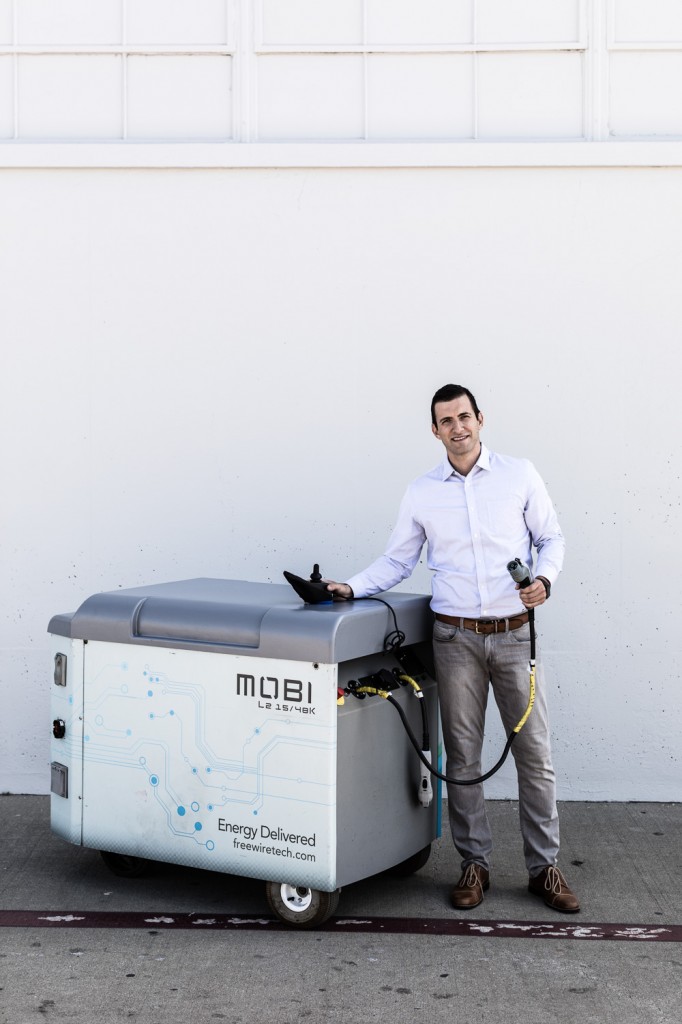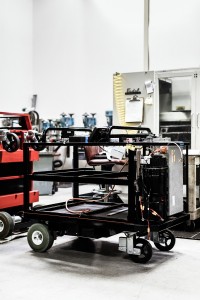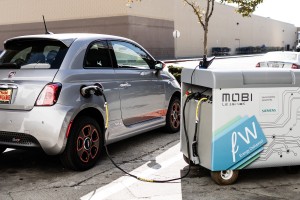Repurposing used EV batteries offers the promise of cheap energy storage, which brings significant environmental and economic benefits for customers, ratepayers and utilities. Repurposed EV batteries also have the additional benefit of providing a revenue stream for EV owners and manufacturers, as well as a chance to avoid the environmental impacts from recycling the batteries prematurely.
Freewire Technologies represents one of the leaders in this field, and I had an opportunity this week to visit their office in San Leandro and discuss the future of the business with CEO Arcady Sosinov.
Freewire takes used Nissan LEAF batteries (and other batteries), tests them for quality, and then repackages the battery modules to fit on a mobile unit called the “Mobi” (see photo to the left). The Mobi batteries are wired together and then packaged for delivery.
The initial market for the Mobi was for mobile EV charging, either Level 2 or fast charging (see photo below). Companies with a Mobi give their employees and visitors the option to charge their vehicles without having to move to a fixed charging spot. The company also doesn’t have to trench wiring to install such a charger.
Meanwhile, when the Mobi is re-charging, it can serve as stationary storage to either charge more cheaply at night for daytime dispatch or potentially offset demand charges. At peak times, property owners can dispatch stored electricity in the Mobi instead of pulling more expensive electricity from the grid.
Recently, other companies have purchased Mobis to replace diesel generators, particularly film and television studios that are shooting off-site. The Mobis are cleaner and quieter and have more reliable power. Utilities have also been buying Mobis as distributed storage to ease usage on congested substations. In addition, some cities have purchased them as backup power units in case of power outages that can also provide grid services when plugged in. Even airports have been buying Mobis to charge the onboard electronics on airplanes without polluting generators on the tarmac.
Ultimately, the sky is the limit for the use of these inexpensive, mobile energy storage units. And as thousands of used EV batteries come out of cars in the coming years, the supply increase will bring down costs and lead to even more innovation.
Arcady is currently expanding his business to meet the growing demand and supply, with plans to fill out a much larger space in his building. He’s bullish about the opportunities, particularly with increasing battery supply and growing recognition of the need for cleaner energy sources, particularly in polluted air districts.
Policy barriers definitely remain, as well as questions about how well the batteries will perform in operation over the long term. We detail some of the policy needs in the UC Berkeley/UCLA Law report Reuse and Repower. But as more companies invest in the opportunities, and innovation continues with companies like Freewire, the constituencies and pressure to change outdated laws and regulations that stymie repurposed battery deployment will only grow.
And that’s good news for Freewire and the industry in general, which is poised to be an important part of our energy storage future.
Leave a Reply
You must be logged in to post a comment.





